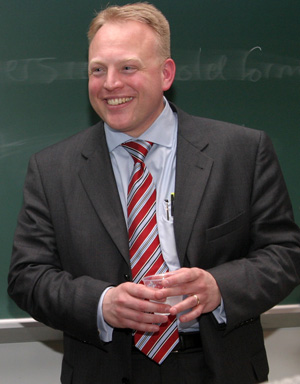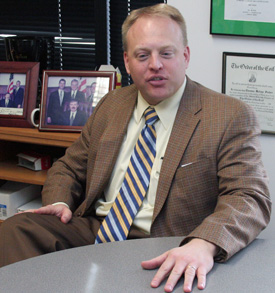Tom Fisher ’91 has an appellate resume many lawyers would envy. Just four years out of law school, he sat second chair for a Supreme Court case. He has withstood the wicked wit of Justice Antonin Scalia, the intellectual prowess of Chief Justice John Roberts and the complex hypothetical’s of Justice Stephen Breyer while serving as the advocate for the State of Indiana.
For him, however, law just runs in the family.
 "My father is a lawyer," Fisher said. "He’s a judge now, but when I was growing up he was a county prosecuting attorney. I had a lot of exposure to legal things. His brother’s a lawyer, in fact, so at family gatherings he’d always talked about the law so it was something he always had in mind."
"My father is a lawyer," Fisher said. "He’s a judge now, but when I was growing up he was a county prosecuting attorney. I had a lot of exposure to legal things. His brother’s a lawyer, in fact, so at family gatherings he’d always talked about the law so it was something he always had in mind."
Fisher is the first Solicitor General of Indiana. Appointed by Attorney General Steve Carter in 2005, he had been with the Attorney General’s office since February 2001. As the first to hold the position, Fisher has worked to establish the job description.
"One of the challenges I face is to establish in Indiana what the Solicitor General does," Fisher said. "I don’t want this to be a position that becomes in any way identified with me in the future; I just want this to be a solid stable position that has a well defined role within the office. I’ll do the best I can to map that out and develop it even more."
"It’s kind of a fuzzy portfolio, There are some fairly well defined tasks like managing the Supreme Court docket. One other thing that is fairly easy to identify is whenever we are coming off a loss in the Court of Appeals in a civil, not criminal, case and we are thinking bout seeking review in the Indiana Supreme Court that comes through me as well."
Before working in the Attorney General’s office, Fisher worked at the Washington firm Jones Day along with fellow Wabash and Indiana Law School alum Greg Castanias ’87.
They graduated four years apart from each other. The two had no real interaction either at Wabash or law school. Nonetheless, the story of Fisher and Castanias is one that typifies post-Wabash connections to other Wabash alumni throughout the business world.
"I was clerking for a federal judge as my first job out of law school," Fisher said, "and didn’t know what I was going to do next. I was looking at various firms in Indianapolis thought maybe it was a good time to try something new. Out of the blue, I received a letter from Greg. It was a form letter he sent to all of the clerks who were working in the Seventh Circuit. I didn’t know him from Adam, but I read through the material and thought the firm looked interesting so I ended up giving him a call and sent him my resume.
"The story from his side is that everybody from his firm thought that I had plagiarized his resume. They (the firm) hardly heard of one person from Wabash let alone two. I had the IU thing and we both studied abroad – there was a lot of overlap."
 Even before his stint as Solicitor General, Fisher had built some experience in front of the highest court in the land. "My first up close and personal experience at the Court," Fisher said, "was about ten years ago in a case where I was still at Jones Day where Greg still is. I sat second chair – which is a huge thrill because I was only four years out of law school and I couldn’t believe it."
Even before his stint as Solicitor General, Fisher had built some experience in front of the highest court in the land. "My first up close and personal experience at the Court," Fisher said, "was about ten years ago in a case where I was still at Jones Day where Greg still is. I sat second chair – which is a huge thrill because I was only four years out of law school and I couldn’t believe it."
"That was a completely breathtaking experience. Sitting at the table, you are so close to the bench. Even though I was standing up when the justices emerged it was almost as if it was a magic trick – poof! There they were. It was kind of a funny visual experience."
In spite of his previous experience with ‘the Court’, Fisher’s first time actually taking the podium and responding to the justices’ questions was without comparison.
"It is different when you know you are the one to argue," he said. "I had plenty of time to sit there and stew because we were the second case argued and when our case came up the other side went first and then I got to go."
Arguing the case would not be Fisher’s first official task that day in front of the court. He first moved for another attorney’s admittance to the Supreme Court bar. One may be admitted by paper or one may go before the court previous to the day’s arguments to be admitted.
"There was an individual who was interested in the case we were arguing and she asked if I would move her admission," Fisher said. "I was honored to do it. They give you a piece of paper that has everything you have to say – they don’t want to leave things to chance. I’ve seen these things go 100 times and so I thought I had the speech committed to memory. I got up there and I started into it and I had a brain cramp. I had to rely on the paper to get me through that."
In spite of his argument and vibrant interaction with the justices, the state of Indiana lost 8-1 with Justice Clarence Thomas voting in their favor.
Fisher notes the type of education he received at Wabash is fundamental in preparing for Supreme Court case by teaching a love for learning and the process by which one advances knowledge.
I try to imagine myself in that role," Fisher said, "especially when it comes to Supreme Court cases. I’m not making the law, but hopefully I’m helping the court advance the understanding of the law and the knowledge of the law. I think that is at the core of what the liberal arts mission is about and what the law is about."
Photos by Clayton Craig '10